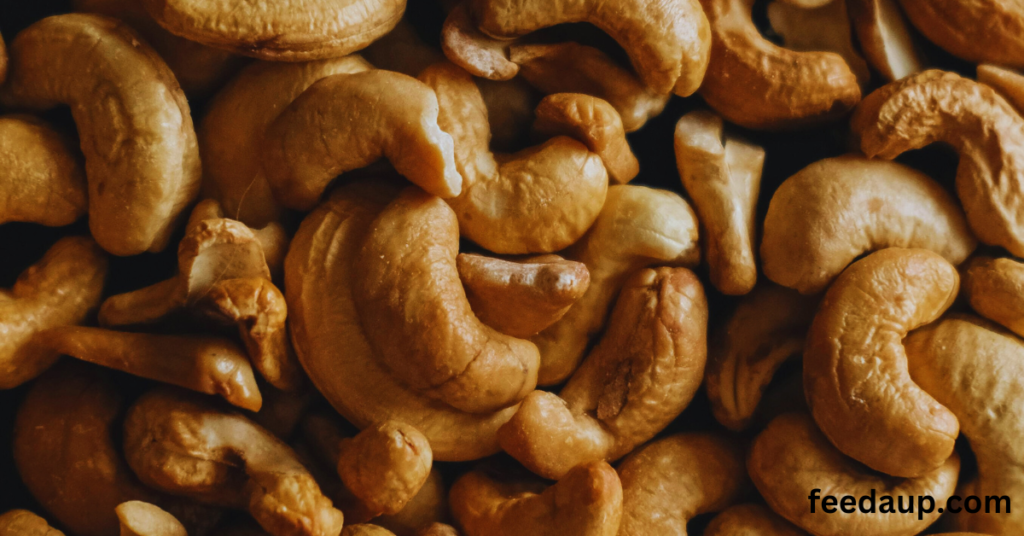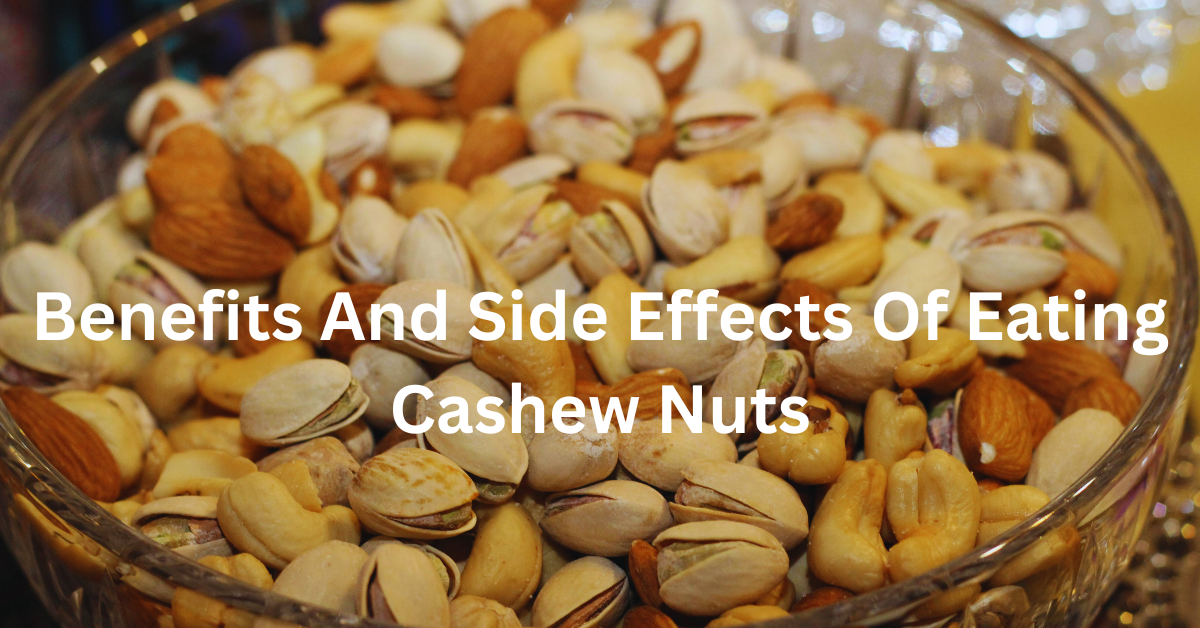Benefits Of Eating Cashew Nuts
Cashew nuts offer numerous health benefits due to their nutrient-rich composition. Here are some of the key advantages:
- Heart Health: Cashews are rich in monounsaturated and polyunsaturated fats, including oleic and linoleic acids, which can help lower bad cholesterol (LDL) levels and raise good cholesterol (HDL) levels, promoting heart health.
- Nutrient Dense: Despite being relatively small in size, cashews are packed with essential nutrients, including vitamins such as vitamin E, vitamin K, and B vitamins (thiamine, riboflavin, niacin, vitamin B6, and folate), as well as minerals such as magnesium, phosphorus, potassium, zinc, and selenium.
- Antioxidant Properties: Cashews contain antioxidants such as vitamin E, which help combat oxidative stress and reduce the risk of chronic diseases by neutralizing free radicals in the body.
- Bone Health: Cashews are a good source of minerals like magnesium, phosphorus, and calcium, all of which are essential for maintaining strong and healthy bones. These minerals contribute to bone density and may reduce the risk of osteoporosis.
- Blood Sugar Regulation: Despite their natural sweetness, cashews have a relatively low glycemic index, meaning they have a minimal impact on blood sugar levels. Incorporating cashews into a balanced diet may help regulate blood sugar levels and reduce the risk of type 2 diabetes.
- Weight Management: Although cashews are calorie-dense, their combination of healthy fats, protein, and fiber can promote feelings of fullness and satiety, potentially aiding in weight management by curbing appetite and reducing overall calorie intake.
- Brain Health: The various nutrients found in cashews, including vitamins E and K, magnesium, and antioxidants, contribute to brain health and cognitive function. These nutrients may help protect against age-related cognitive decline and support overall brain function.
- Healthy Skin and Hair: Cashews contain compounds like antioxidants, zinc, and selenium, which play crucial roles in maintaining healthy skin and hair. These nutrients promote collagen production, protect against UV damage, and support hair growth and strength.
- Muscle Health: Cashews are a good source of protein, which is essential for muscle repair, growth, and maintenance. Including cashews in your diet can help meet your protein needs, especially for individuals following vegetarian or vegan diets.
- Versatility in Cooking: Cashews are incredibly versatile and can be enjoyed in various forms, including raw, roasted, or as a dairy alternative in the form of cashew butter or cashew milk. This versatility makes it easy to incorporate cashews into a wide range of dishes, from savory to sweet.
While cashews offer numerous health benefits, it’s essential to consume them in moderation, as they are calorie-dense and excessive intake may lead to weight gain. Additionally, individuals with nut allergies should avoid cashews and other tree nuts to prevent allergic reactions.

Side Effect of Eating Cashew Nuts
While cashew nuts offer many health benefits, there are potential side effects associated with their consumption, particularly when consumed in excess or for individuals with specific health conditions or allergies:
- Allergic Reactions: Cashew nuts are one of the common tree nuts known to cause allergic reactions in some individuals. Allergic reactions to cashews can range from mild symptoms such as itching, hives, or swelling to severe reactions including difficulty breathing, anaphylaxis, or even death in extreme cases. Individuals with known nut allergies should avoid cashews and other tree nuts to prevent allergic reactions.
- Weight Gain: Cashew nuts are calorie-dense due to their high fat content. Eating large quantities of cashews, especially if not accounted for in overall calorie intake, can contribute to weight gain over time.
- Potential Oxalate Content: Cashew nuts, like many other nuts and seeds, contain oxalates, compounds that can contribute to the formation of kidney stones in susceptible individuals. Individuals prone to kidney stones may need to moderate their intake of cashews and other high-oxalate foods.
- Digestive Issues: Some people may experience digestive discomfort, bloating, or gas when consuming cashew nuts, particularly if eaten in large amounts or if not chewed thoroughly. This can be due to the high fiber content of cashews or difficulty digesting certain components of the nuts.
- Toxicity Risk from Raw Cashews: Raw cashews contain urushiol, a toxic compound also found in poison ivy and poison sumac. Urushiol can cause skin irritation or allergic reactions in some individuals. However, commercially sold cashews are typically processed to remove the urushiol, making them safe for consumption. It’s essential to ensure that cashews are properly processed and stored to avoid any potential toxicity.
- High Fat Content: While the fats in cashews are predominantly healthy monounsaturated and polyunsaturated fats, consuming large quantities of cashews can still contribute to a high intake of total fat and calories, which may not be suitable for everyone, especially those with specific dietary restrictions or weight management goals.
- Potential Aflatoxin Contamination: Like other nuts, cashews can be susceptible to aflatoxin contamination, which is produced by certain molds. Aflatoxins are carcinogenic compounds that can pose health risks if consumed in high amounts. Proper storage and handling of cashews can help minimize the risk of aflatoxin contamination.
- Interference with Medications: Cashew nuts contain vitamin K, which plays a role in blood clotting. Consuming large amounts of cashews may interfere with blood-thinning medications, such as warfarin (Coumadin), leading to potential complications. Individuals taking blood-thinning medications should monitor their intake of vitamin K-rich foods, including cashews, and consult with their healthcare provider for personalized dietary advice.
While cashews can be a nutritious addition to a balanced diet for many people, it’s essential to consume them in moderation and be mindful of potential side effects, especially for those with allergies, specific health conditions, or dietary restrictions. If you have any concerns or experience adverse reactions after consuming cashews, consult with a healthcare professional for guidance.
Reduce Your Risk
To reduce the risk of potential side effects associated with cashew nut consumption, consider the following tips:
- Monitor Portion Sizes: Enjoy cashews in moderation and be mindful of portion sizes, especially if you’re watching your calorie intake or trying to manage your weight. Stick to recommended serving sizes to avoid excessive calorie consumption.
- Be Aware of Allergies: If you have a known allergy to tree nuts or cashews, avoid consuming cashew nuts altogether and read food labels carefully to avoid accidental exposure to cashew-containing products.
- Choose Roasted or Unsweetened Varieties: Opt for roasted cashews without added oils, salt, or sugar to minimize unnecessary additives and control your intake of added fats and sodium.
- Practice Proper Chewing: Chew cashew nuts thoroughly to aid digestion and reduce the risk of digestive discomfort or bloating associated with consuming nuts.
- Incorporate Variety: Enjoy a variety of nuts and seeds in your diet, including almonds, walnuts, pistachios, and sunflower seeds, to diversify your nutrient intake and reduce the risk of overconsuming specific nutrients or compounds found in cashews.
- Consider Soaking: Soaking cashews in water before consuming them may help reduce their phytic acid content, which can interfere with mineral absorption and contribute to digestive issues in some individuals.
- Opt for Cashew Butter: Consider using cashew butter as an alternative to whole cashew nuts, especially if you have difficulty digesting whole nuts or prefer a smoother texture. Look for varieties with minimal added ingredients and no added sugars.
- Store Cashews Properly: Store cashew nuts in a cool, dry place in airtight containers to maintain their freshness and prevent spoilage. Proper storage can also help minimize the risk of mold contamination and aflatoxin exposure.
- Consult with Healthcare Professionals: If you have specific dietary concerns, allergies, or health conditions, consult with a healthcare professional, such as a registered dietitian or allergist, for personalized dietary advice and recommendations tailored to your individual needs.
By following these tips, you can enjoy the nutritional benefits of cashew nuts while minimizing potential risks and incorporating them into a balanced and healthy diet.
